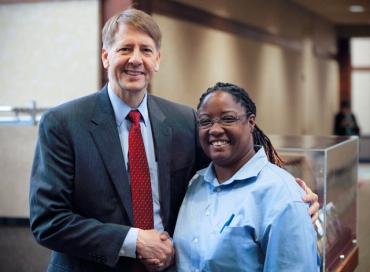People who take out student loans should be able to rely on loan servicers to help them repay those loans as quickly as possible. Instead, student-loan servicers are giving out incorrect information, withholding services that could help borrowers pay debt faster, and hindering, rather than helping, millions of people already struggling to pay back student debt. So says a new report released June 22 by the federal Consumer Financial Protection Bureau.
One of the most egregious abuses by loan servicers has been withholding information about Public Service Loan Forgiveness, a program that forgives student debt for people who work in public service jobs, after they have made regular loan payments for 10 years. Often, these are lower-pay jobs such as teaching, nursing, social service and first response.
"Borrowers have told us about student loan industry practices that delay or deny access to expected help such as the Public Service Loan Forgiveness Program," CFPB Director Richard Cordray said at a press event June 22. "We want those in public service jobs who give back to our communities to be able to stay on track and not worry about unnecessary debt due to servicer errors."
AFT member and paraprofessional Saundra Mobley, who works with children who have special needs and severe disabilities, joined Cordray to tell her story (pictured above). She said that every year, she submits paperwork to recertify her income-based repayment loan, and every year, the process is botched. As a result, she winds up paying more interest as her loan repayment is delayed. With a pay rate of $10 an hour, her $350-a-month loan payments are nearly impossible, and the "headache" of dealing with an unresponsive loan processor only adds to the stress.
"Out of three children, I'm the first to graduate and go to college," said Mobley. "The other two refused to deal with the headaches I deal with." Mobley is persisting, earning her master's degree so she can advance her career, but mounting student loan debt is making her dream seem nearly impossible.
The CFPB estimates that 25 percent of the U.S. workforce is employed in some form of public service, and many may be eligible for loan forgiveness under Public Service Loan Forgiveness. So far, more than 500,000 people have signaled their intention to pursue debt relief under this program. According to the Department of Education, nearly two-thirds of them earn less than $50,000 per year, and 86 percent earn less than $75,000 per year.
The report focuses on complaints about servicing problems that may knock borrowers off track as they seek loan forgiveness earned through their public service and guaranteed by federal law. Complaints describe incorrect information about loan-forgiveness eligibility, processing delays and errors, and job certification problems, all of which can cause borrowers to miss payments and extend the life of and interest on their loans.
The AFT has advocated that regulations controlling these abuses be maintained, but the Trump administration has indicated it will roll them back and even cut the Public Service Loan Forgiveness Program entirely. Meanwhile, borrowers like Nicole Hochsprung continue to struggle through an insufficient and even deceptive loan servicing system.
The AFT offers student debt clinics, like one that Mobley attended, to help members find the best way out of student debt. And the CFPB has launched a campaign to educate borrowers and empower them to work toward student loan forgiveness and a debt-free life. This resource answers questions borrowers may have and helps put them on the road to debt payment.
Read the CFPB's report online. For more information on the AFT's student debt clinics email debtclinics@aft.org.
[Virginia Myers, CFPB press release and photo]

